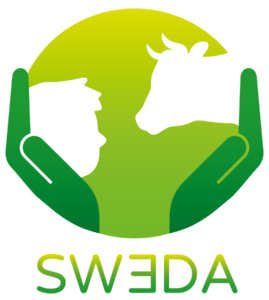Within SWEDA’s framework, students were able to design and implement specific projects focusing on different local problems related to the main goals of the project, promoting diversification of agricultural activities, according to the principles of sustainable rural development and multifunctionality. These projects were developed and presented by students from different countries during the last in-person workshop that took place in Germany.
- Social Gardening
This project was targeted at combating the lack of entertainment and hobbies as well as the loneliness in retirement homes, to list a few. The students developed a timed project plan organized in work packages and implemented it in Germany, during the event, and in Italy based on its planned activities.
- SustAT4Farms22
The acronym stands for Sustainability Assessment Tool for Farms, a project where the main goal is to apply the FSE (Farm Sustainability Evaluator), a tool developed by the students. It consists of a GHG emission calculator and a multicriteria analysis evaluator to assess the farm’s current situation and help with decision-making.
- The taste of landscape
This student project focused on supporting local farmers to maintain meadow orchards while having a bigger impact in the local community by promoting a participation campaign for collecting the apples and processing them a well as an educational program.
- Reuse of aquaculture waste for energy production
Also referred to as RAWE, this project tackles the growing generation of fish waste and finding solutions to manage it. The specific objectives are to analyze two technological development scenarios: biogas and fertilizer production from fish co-products and wastes, and thermal processing of fish co-products to produce oil and protein concentrates.
- SDA Life Cycle Analysis
Sustainable Development in Agriculture by implementing the Life Cycle Analysis integrating the social farming is a project developed by the students within SWEDA’s framework. It aims to solve problems of small farmers who cannot grow or invest as planned. Using the Life Cycle Analysis (LCA) methodology, an analysis of the environmental impact of the products produced by the farmer considering the daily activities, and livestock was promoted, making it possible to develop a sustainable farm and increase its accessibility.
- ZERO WASTE
Students aimed to design an energy recovery plant for the farm, that could help the farmers to maximize the use of the energy from their field activities such as production of crops and animal husbandry waste, as well as to solve irrigation issues as seen in their field visits.
- Environmental Training for a Sustainable Community
The project aims to tackle the problems that arise from the rise of urbanization such as increased waste and the isolation of rural areas, creating a disconnect between the two worlds. Therefore, the specific objectives are to encourage exchange among people to encourage the development of sustainable communities across rural and urban areas. The project’s broadness allows for specific applications according to the communities’ specific interests and needs.

